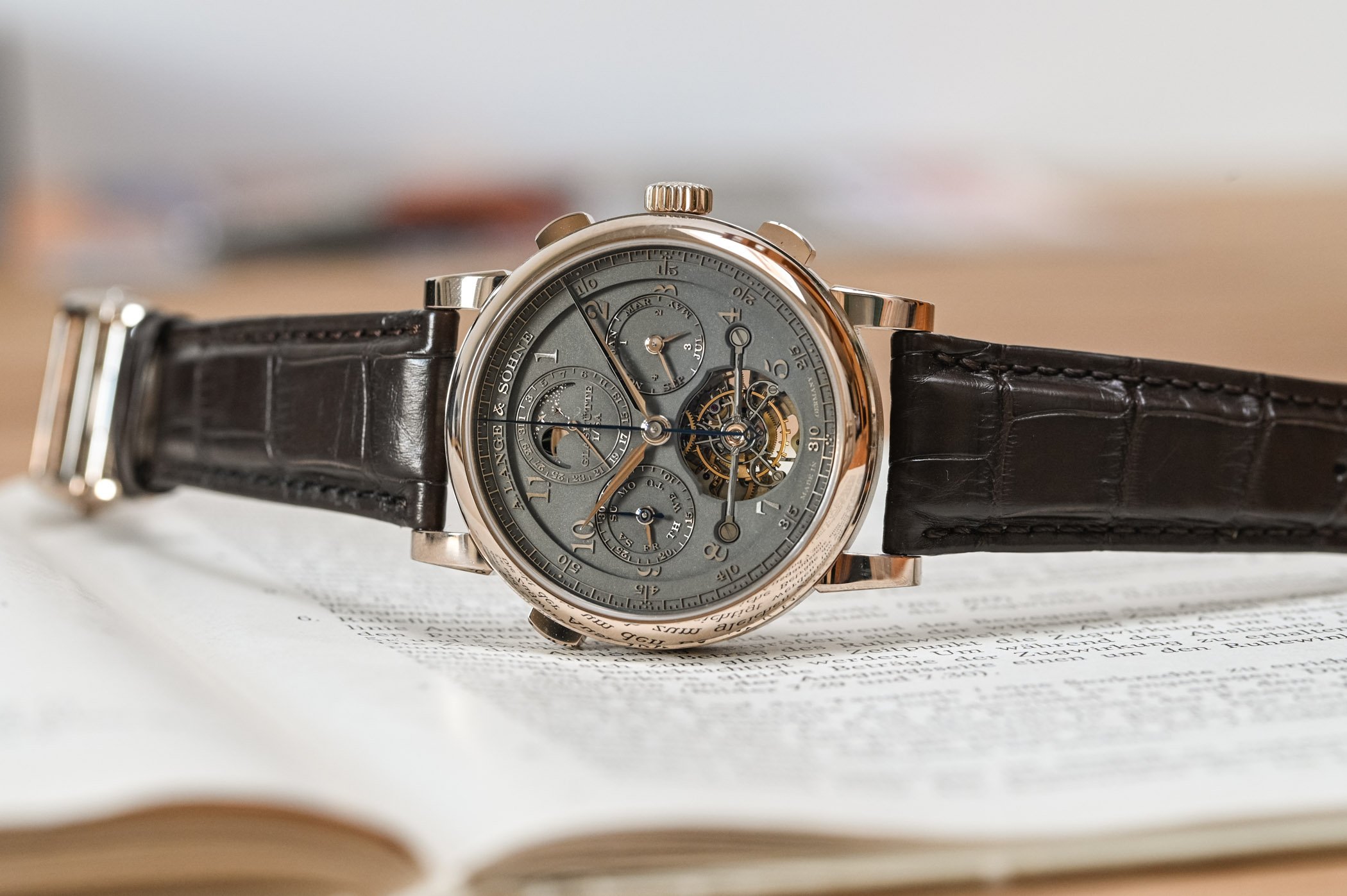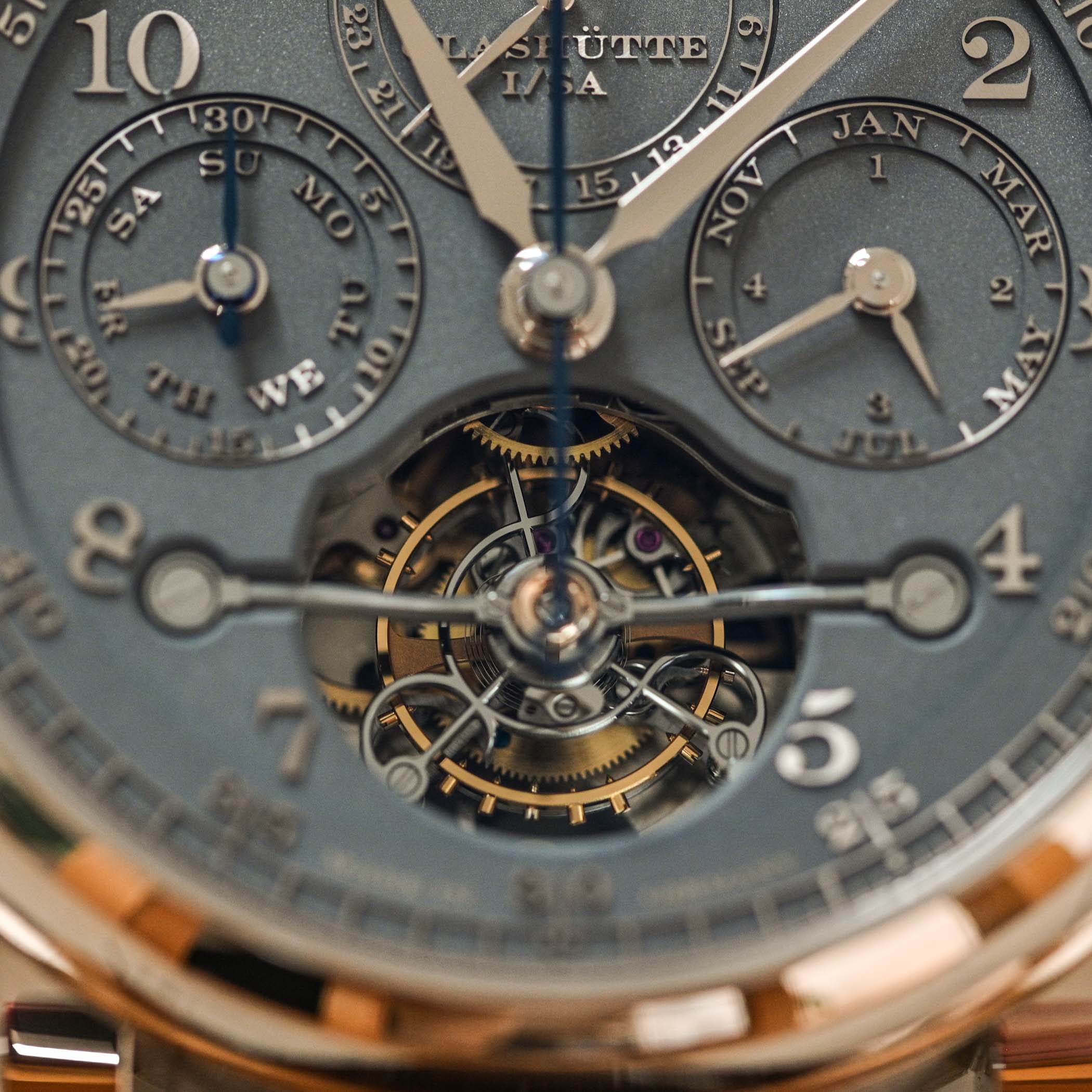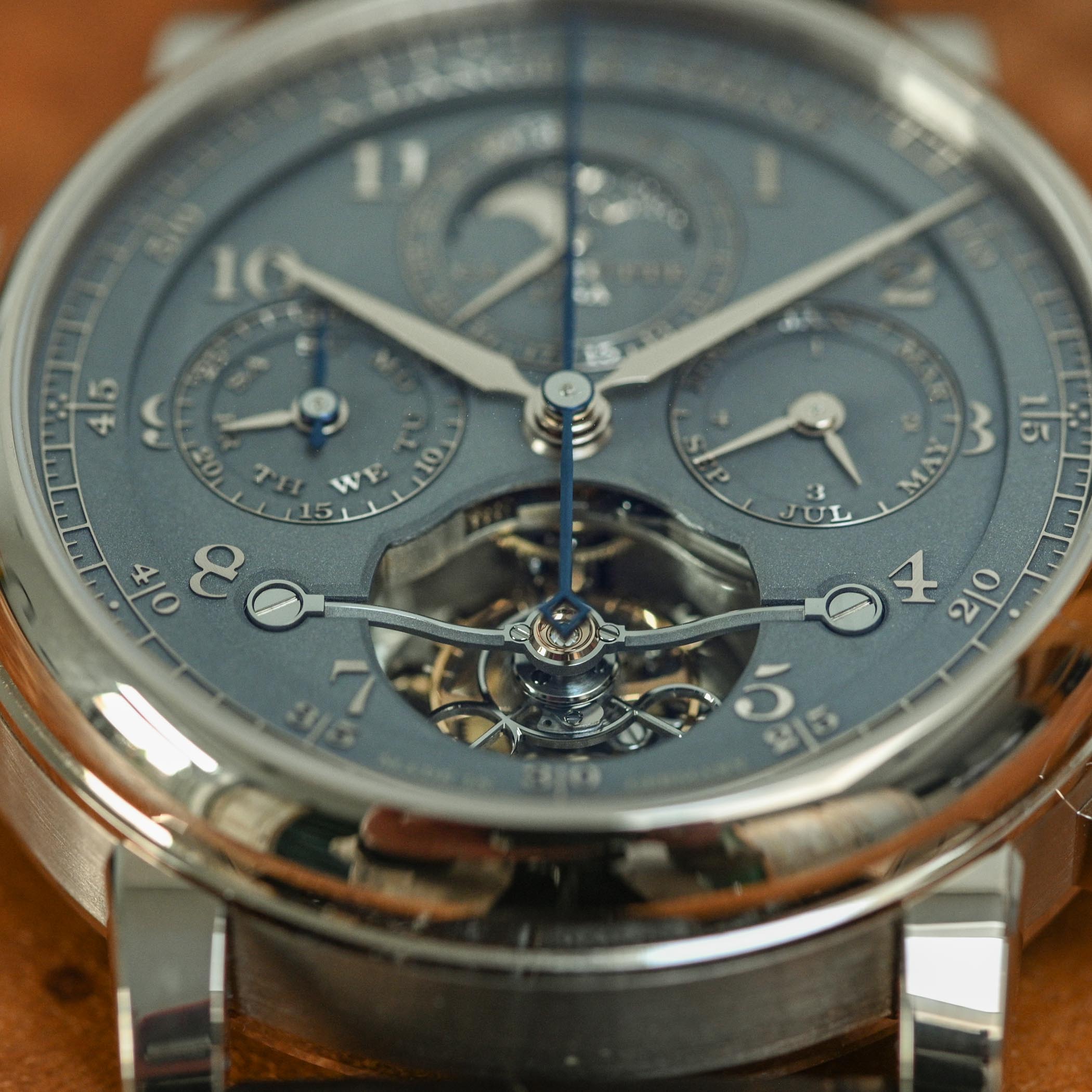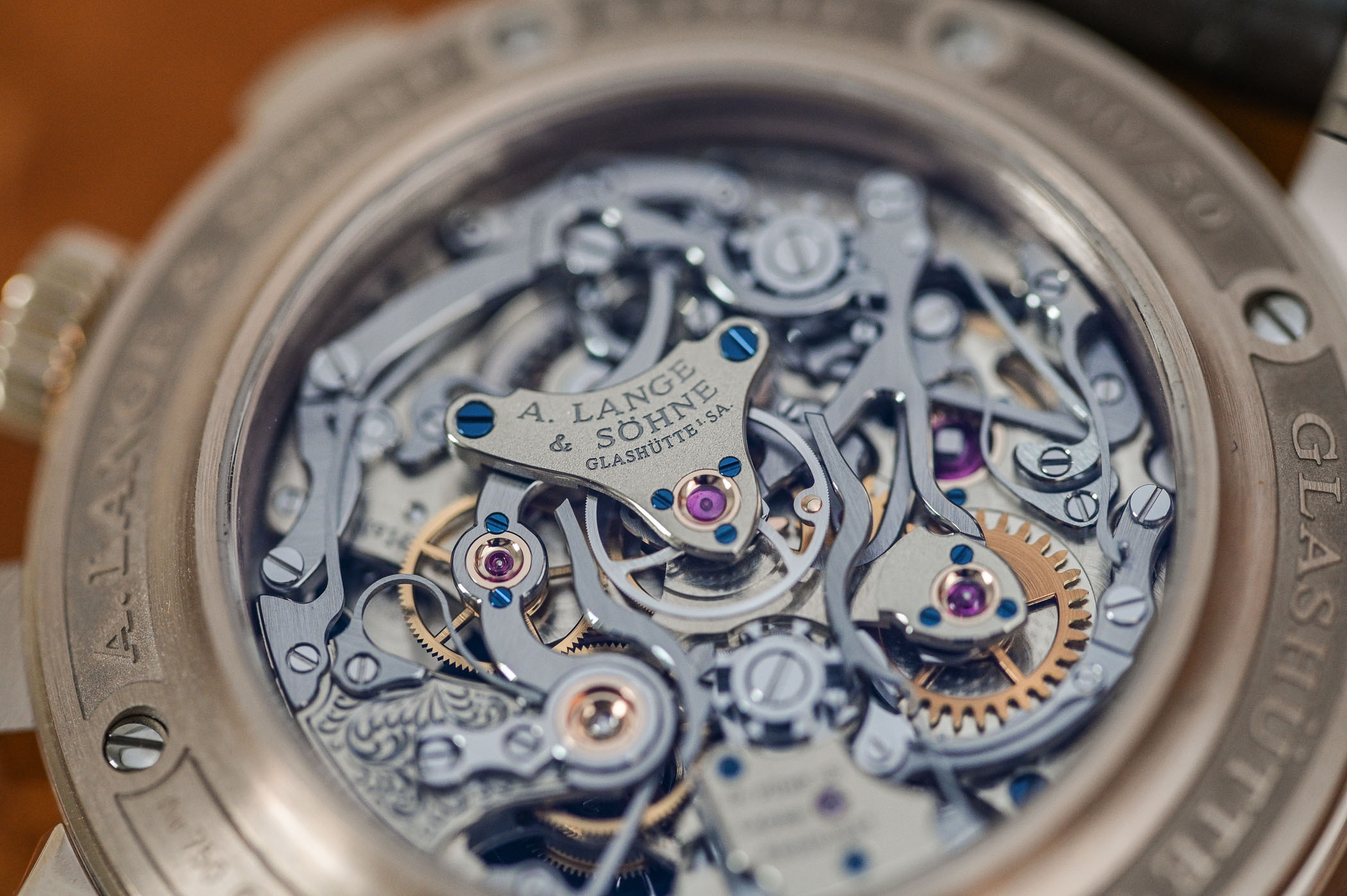A. Lange & Söhne Tourbograph Perpetual Honeygold
Dreaming of a Lange Tourbograph Perpetual Christmas…

With the festive season looming and difficulties ahead for many of us to be reunited with our families and loved ones, we’ve decided to get a festive fix and introduce some cheer into our lives with a little help from our faithful horological companions. And what better way to indulge than with the most complex and mechanically endowed member of A. Lange & Söhne’s collection? As part of the trilogy of watches released to celebrate the establishment of Ferdinand Adolph Lange’s watchmaking company in Glashütte 175 years ago, the Tourbograph Perpetual Honeygold is the whole package with all the trimmings – and by trimmings we mean a fusée-and-chain transmission with a tourbillon, a rattrapante chronograph, a perpetual calendar and a precision moon phase. 2020 might just redeem itself for watch lovers thanks to the majestic entry of this splendid Tourbograph model. Cloaked in sumptuous Honeygold with a hypnotic black rhodium dial, this alluring model bears gifts that would put the Three Wise Men to shame. Limited to just 50 pieces and with a six-figure price tag, it is a dream watch for many of us – but dreaming is free.
Chapter Two
Many of you will remember the maiden voyage of the Tourbograph Perpetual “Pour le Mérite” in 2017. Released in a limited edition of 50 pieces in platinum with a silver dial, the watch sent our team into delirious states of ecstasy and praise. Although it is not considered a grand complication because it doesn’t have a chiming function – Lange had already produced its EUR 1.9 million Grand Complication Grand Grail watch with seven complications in 2013 – the sophisticated technicality of the Tourbograph Perpetual “Pour le Mérite” and its combination of a tourbillon and a fusée-and-chain transmission to deal with gravity and waning spring force was an even more enticing horological delight for connoisseurs.
The three honeygold kings
On an icy winter’s day, 175 years ago, 30-year-old entrepreneur Ferdinand Adolph Lange laid the cornerstone of his pocket watch workshop in the small town of Glashütte, Saxony. When F.A. Lange founded his pocket watch workshop on 7 December 1845 in Glashütte, he also laid the foundations of Germany’s venerable precision watchmaking industry. Unveiled as part of a trilogy to celebrate the founder and 175 years of watchmaking in Glashütte, the Tourbograph Perpetual Honeygold is flanked by the 1815 Thin Honeygold and the 1815 Rattrapante Honeygold. The common denominator of these anniversary editions is the use of Honeygold, a top-secret alloy developed for Lange in 2010 with a unique colour comparable to that of honey and reserved for Lange’s most exclusive timepieces.

Harder than platinum and other gold alloys – and therefore much harder to shape and finish – Honeygold has an extremely subtle and elegant tone that cannot be compared to more brazen yellow gold or bright rose gold. The case of the Tourbograph Perpetual is large (43mm diameter x 16.6mm height) and I daresay you wouldn’t want it any other way. This is not a discreet, slide-under-your-cuff dress watch. The Tourbograph Perpetual is an effusive and expressive watch. It is the pinnacle of Lange’s watchmaking prowess and is a watch that needs to be admired and enjoyed.
A heavenly dial
Without computing the sensational technicality of the watch, another factor that distinguishes the Tourbograph from its anniversary cohorts is its dial. When I first presented the watch in September, I relied on press images. Now that we have had the immense pleasure of meeting the watch in person, I can assure you that the press images do not do justice to the dial. What looked like a light-grey colour in the official pictures is actually a much darker grey colour in the metal.
Possibly the most beautiful dial I have encountered, the contrast between the dark granular background and the elements in Honeygold is simply stunning. But, there is more: the numerals, scales and logo on the dial are not applied but sculpted in relief from the 18k Honeygold base plate (emerging with a height of about 0.15mm from the base), which in turn is treated to a black rhodium-plated finish. Not only is this a prodigious feat of handiwork, it adds an incomparable three-dimensional effect.
Despite the impressive amount of complications competing for your attention on the dial, it remains perfectly legible thanks to the layout and pleasing symmetry. The three sub-dials in the upper half are dedicated to the perpetual calendar and moon phase functions: the moon phase indicator and pointer date are at 12, the months and leap year at 3 and the 30-minute chronograph totaliser and day of the week at 9 o’clock. The large aperture at 6 o’clock houses the 1-minute tourbillon held in place by a curved bridge. Since this is a rattrapante or split-seconds chronograph, it has two hands. One of the chronograph hands is picked out in blued steel – matching the hand on the 30-minute counter – and the other chronograph hand is also in steel, but gold plated to match the 18k Honeygold hour, minute and calendar display hands.
Devilishly delightful details
If you look at the aperture of the tourbillon, you’ll notice that it is not round but slightly indented at the top so as not to interfere with the circular sub-dials of the perpetual calendar. The tourbillon is also set deep inside the case, well below the level of the dial. To secure the deep-set tourbillon, Lange’s watchmakers had to come up with a curved bridge that dips down into the aperture. Held in place by a polished gold chaton and topped with a diamond endstone, the tourbillon bridge is hand-finished with a flawless black-polish on top while the sides are matte finished.
Other details that will delight connoisseurs lie in the overall finissage or finishings throughout. From the slightly cambered gold moons to the hand-engraved stars, from the gleaming polished bezel to the contrasting brushed casebands and pushers, from the needle-like thinness of the central chronograph hands to the brushed finish on the raised 18k Honeygold elements of the dial…
Everything speaks of the impeccable attention to detail and lovingly handcrafted touches we associate with Lange. However, being an example of the finest Glashütte watchmaking tradition, it is also a watch of impeccable precision.
The fine art of Precision
The precision of each of the five complications is optimum. The moon phase display deviates from the true position of the Moon by only one day in 122.6 years. The perpetual calendar is equipped with a 48-step cam and calibrated to indicate all month durations correctly until 1 March 2100. The chronograph, and its sophisticated rattrapante (split-seconds) functionality, means that the blued steel hand can be stopped independently of the gold chronograph hand. This allows you to record multiple time intervals that start at the same time but don’t necessarily end at the same time – for instance, timing a full race and intermediate laps. To perform these double measurements, the mechanical switching processes are controlled with two column wheels and a horizontal clutch.

In the name of improving the rate accuracy of the watch, you have the double combination of the tourbillon, designed to minimise the effect of gravity, and the presence of a fusée-and-chain transmission, which addresses the waning force of the mainspring. Composed of 636 individual parts, the chain, together with the fusée, equalises the waning force of the mainspring and ensures that the movement always received a constant amount of energy. To guarantee that the watch continues to run even while it is being wound, the fusée accommodates a tiny planetary gear system.
Mind-bendingly complex calibre L133.1 and artisanal finishes
The view from the sapphire crystal caseback is breathtakingly beautiful. Without the traditional three-quarter plate found on many Lange watches that obscures much of the movement – actually, it is there, but so far into the entrails of the movement that you can barely see it – the view of the calibre L133.1 is even more spectacular. The technical orchestration of this 684-piece – not including the 636 individual parts of the chain – masterpiece is contained in a manual-winding movement measuring 32mm in diameter and with a height of 10.9mm. The movement beats at 21,600vph and can store up to 36 hours of power. Although Lange had already produced a watch with a fusée-and-chain transmission, a tourbillon and a rattrapante chronograph in 2005, the Tourbograph ‘Pour le Mérite’, the incorporation of a perpetual calendar meant the inclusion of 206 additional parts and a redistribution of the power flows in the movement.
To mark the 175th anniversary of watchmaking in Glashütte, the decoration on the movement reflects some of the finishings found on the dial. The surfaces of the German silver bridges have a granular texture, and the inscriptions are picked out in black rhodium. You can discern the two column wheels and even the diamond endstone placed on the hand-engraved balance cock along with the lively flashes of colour provided by the bright pink rubies set in gold chatons and the blued screws. Perhaps the only quibble about the movement is the fact that you can’t see the fusée-and-chain.
All I can say is that I feel for the watchmakers at Lange who undertake Lange’s policy of assembling every movement twice! Following the first assembly, the movement is taken apart, and all its components cleaned in an ultrasonic bath before the second assembly can commence. At this stage, one single watchmaker is responsible for the entire movement before it can be cased up and submitted to testing.
Price & availability
Sorry to wake you up from the reverie, but a shot of reality is called for. This spectacular Tourbograph Perpetual Honeygold is limited to just 50 pieces and comes with an equally spectacular price tag of EUR 500,000. More information at A. Lange & Söhne.
Season’s greetings!






















2 responses
That open dial,just fugly.
Looks like wrecked instrument from submarine. Truncated indexes add to overtrashed dial.